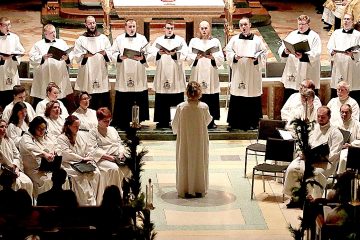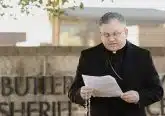Archdiocesan Pastoral Council meets at Athenaeum
By Steve Trosley
The financial outlook for the Archdiocese of Cincinnati continues to improve, but the issue of meeting pension obligations for retiring priests will continue to challenge its resources and financial mangers.
Deacon Jeff Merrill, from St. Maximillian Kolbe Parish, Liberty Township, told the Archdiocesan Pastoral Council at its regular meeting March 9 at the Athenaeum that the financial report showed a “solid plan” to fund outstanding obligations in the lay employee retirement plan.
“We’re in good shape. I’m confident we will meet our obligations,” to lay employees, Archdiocesan Finance Director Richard Kelly said.
Deacon Merrill represents the St. Andrew Deanery on the council. He chaired this year’s APC Finance Review Committee, which reviews the annual Archdiocesan Finance Report.
Kelly said that of greater concern was the priest retirement fund deficient of $80 million, but he also said that parish contributions to that fund were helping slowly chip away at the deficit.
Kelly also said that the health care insurance program was running at a surplus, which helped mitigate the impact of premium increases. He also explained that the archdiocese, which is self-insured, could not pass premium increased on to employees because that would affect the program’s status under the Health and Human Services Contraceptives mandate of the Affordable Care Act.
Accounting Manager Steve Burger told the council that the insurance fund surplus would help keep increases to around five percent over the next four to five years.
He said that receivables were under control as “the archdiocese has gotten out of the banking business” and delinquent loan payments from parishes have been removed from the books. “We continue to lower Central Office operating expenses,” he said.
Deacon Merrill reminded council members that the cost of the benefits program affects the archdiocese’s ability to attract and hire quality employees.
Other members of the review committee were Michael Hall from St. Bernadette Parish in Amelia and representing the St. Martin Deanery, Ronald Kienzle from St. Jerome Parish and representing the St. Francis de Sales Deanery, and Daniel Schindler from Sacred Heart Parish in Fairfield and representing the Hamilton Deanery.
Earlier in the meeting, Ted Bergh, CEO of Catholic Charities Cincinnati and Laura Roesch of Catholic Charities of the Miami Valley, presented detailed accounts of the work being done by their agencies in their respective locations.
“We’re not about enabling the poor to stay poor,” Bergh said explaining his agency’s mission statement. He said the agency was focused on ending “material and spiritual poverty.”
Bergh touched on the agency’s work with refugee resettlement and also explained that the agency could supply mental health services, even to those who did not have financial need and might have insurance coverage.
Roesch also discussed Erma House, a safe haven for children.
They also discussed how they expand the services offered by food pantries — personal shoppers assist clients in building nutritious menus and determining a family’s unique meal needs — and how they are always seeking to build on their already significant corps of volunteers.
In other action, Archbishop Dennis M. Schnurr explained that the modifications to the HHS contraceptives mandate, while not rejected by the U.S. bishops as reported in the mainstream media, “Don’t go far enough.” He explained that while religious institutions seemed to be exempted, the application of the rule to Catholic charities, hospitals and universities was still be debated by legal authorities.
The HHS mandate is an administrative rule that resulted from the passage and signing into law of the Affordable Care Act of 2012. The Health and Human Services Department interpretation of the law requires that all employers, except those religious entities specifically serving clients of their own faith, must provide free contraceptive insurance coverage, including drugs that may cause abortions.
The archbishop also described the experience of having an armed guard during his recent visit to Honduras with a group from the archdiocese, including parishioners from St. Margaret of York.
The archbishop said there was no specific result measured from the “Catholics Come home” campaign that was funded by a special collection but he said he received several thank-yous for the book, Rediscovering Catholicism that was distributed as a gift at Christmas.













